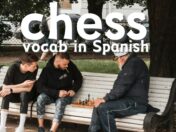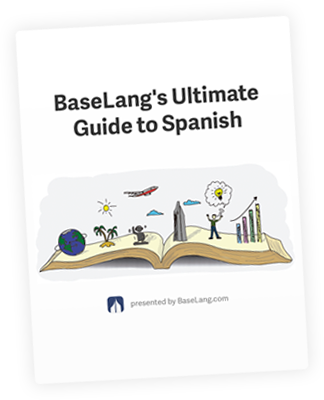Estar Conjugation: A Complete Guide to the Conjugation of Estar

Get our free email course, Shortcut to Conversational.
Have conversations faster, understand people when they speak fast, and other tested tips to learn faster.
More infoThe verb estar is one of the key verbs in Spanish. We use estar in many situations, and to express different ideas. With this in mind, every Spanish learner needs to know how to use estar, and also have a solid grasp of estar conjugation.
In this post, we’ll cover each and every estar conjugation. We’ll begin with a quick section to introduce the meanings of estar. Then we’ll dive into our sections on estar conjugation, breaking the tenses down into indicative, subjunctive, and imperative moods. For every tense, we’ll provide a complete estar conjugation chart.
Once we’ve gone over every estar conjugation, we’ll finish up with a set of practice exercises so you can practice what you’ve learned. Now let’s get started!
Estar Meanings
Estar is translated into English as to be. As you may be aware, the verb to be in Spanish can be translated as either estar or ser. These two verbs cannot be used interchangeably! Estar and ser are used in distinct situations and to express different meanings.
In this post our focus is on estar. For an in-depth series of comparisons between the two options for to be in Spanish, please take a look at our post on ser vs estar. For a comparable post to this one, refer to our post on ser conjugation.
Estar is used to talk about short-term states and emotions, such as being happy or sad.
- Sofi is happy because she went on vacation. – Sofi está feliz porque se fue de vacaciones.
Estar is used to talk about the location of a person, a place, or an object.
- María is in Buenos Aires. This city is in Argentina. – María está en Buenos Aires. Esta ciudad está en Argentina.
Estar is used with the gerund to create the present progressive form, equivalent to -ing in Spanish.
- We are watching the movie you recommended to us. – Estamos viendo la película que nos recomendaste.
Estar Conjugation
Estar is an irregular verb. This means that it doesn’t follow a specific conjugation pattern that we see in regular verbs. Does this mean that estar conjugation is challenging? Don’t worry! Although several tenses have unique conjugations that need to be memorized outright, several other tenses follow regular -ar verb conjugation patterns.
For the rest of the post, we will be covering every possible estar conjugation in detail along with many examples to illustrate each mood and tense. If you’re looking for in-depth explanations of a specific mood or tense, we also provide links to our dedicated posts for each one. For a broad overview of them all, check out our big post on all the Spanish verb tenses.
Without further ado, let’s move on to our sections on estar conjugation, organized according to mood and tense.
Estar Conjugation: Indicative Mood
We use the indicative mood to talk about certainties and concrete facts. In this section, we present you with the estar conjugation charts for the present, preterite, imperfect, conditional, future, and compound indicative tenses.
Estar present conjugation
As an irregular verb, present estar conjugation changes its endings in all persons, except for the first-person plural nosotros / nosotras, which remains regular.
| Subject | Estar present tense conjugation |
| Yo | estoy |
| Tú | estás |
| Él, Ella, Usted | está |
| Nosotros, Nosotras | estamos |
| Vosotros, Vosotras | estáis |
| Ustedes, Ellos, Ellas | están |
- I’m at the pharmacy today. – Yo estoy en la farmacia hoy.
- The workers are in front of the city hall. – Los trabajadores están frente al ayuntamiento.
- We’re tired of cleaning all day long. – Estamos cansadas de limpiar todo el día.
To learn more about this tense, check out our post on the simple present tense in Spanish.
Estar preterite conjugation
In the preterite tense of the verb estar, the irregular stem estuv- remains constant across all subjects, while the endings are all regular.
| Subject | Estar preterite tense conjugation |
| Yo | estuve |
| Tú | estuviste |
| Él, Ella, Usted | estuvo |
| Nosotros, Nosotras | estuvimos |
| Vosotros, Vosotras | estuvisteis |
| Ustedes, Ellos, Ellas | estuvieron |
- Benjamín was at Eugenia’s house last night. – Benjamín estuvo en casa de Eugenia anoche.
- After his graduation we were all very happy. – Después de su graduación estuvimos todos muy felices.
- Joaquín was looking for her daughter all night long. – Joaquín estuvo buscando a su hija toda la noche.
For more details on this tense, take a look at our post on the Spanish preterite. For additional conjugations, we have another post looking specifically at more irregular preterite verbs.
Estar imperfect conjugation
For the imperfect conjugation of estar, the irregular stem is estab- for all subjects. The endings follow the pattern of regular -ar verbs.
| Subject | Estar imperfect conjugation |
| Yo | estaba |
| Tú | estabas |
| Él, Ella, Usted | estaba |
| Nosotros, Nosotras | estábamos |
| Vosotros, Vosotras | estabais |
| Ustedes, Ellos, Ellas | estaban |
- Fiona was very sad because of the news. – Fiona estaba muy triste por la noticia.
- When we were kids, we were in the park all day long. – Cuando éramos niños estábamos en el parque todo el día.
- When we arrived, the chef was still cooking. – Cuando nosotros llegamos, el chef todavía estaba cocinando.
If you want a refresher on this tense, check out our dedicated post on the imperfect tense in Spanish. To compare the two Spanish past tenses we’ve just looked at, we also have a specific post on preterite vs imperfect. And specific to today’s lesson, we even have a dedicated post on estar and ser in the past tense.
In case you need to freshen up your knowledge on imperfect tense in Spanish, go to our dedicated post about it. If that’s not the case, but you still have some doubts on how to use ser and estar in the past tense, you can also check our post ser and estar in the past tense.
Estar conditional conjugation
In its conditional conjugation, estar again follows the regular pattern. We only need to add the -ía, -ías, -íamos, -ían, -íais endings like with any other regular -ar verb.
| Subject | Estar conditional conjugation |
| Yo | estaría |
| Tú | estarías |
| Él, Ella, Usted | estaría |
| Nosotros, Nosotras | estaríamos |
| Vosotros, Vosotras | estaríais |
| Ustedes, Ellos, Ellas | estarían |
- You would be here if you had woken up earlier. – Estarías aquí si te hubieras levantado más temprano.
- She would be happy to see you if you come. – Ella estaría feliz de verte si vinieras.
- We would be learning French, but we decided to learn Chinese. – Estaríamos aprendiendo francés pero decidimos aprender chino.
If you want more details on how to use the conditional verb forms in Spanish, check out our dedicated guide to the Spanish conditional.
Estar future conjugation
For our estar future conjugation, we have a regular stem, estar-, and the endings are the same as other regular -ar verbs.
The future tense conjugation of estar is translated into English as will be.
| Subject | Estar future conjugation |
| Yo | estaré |
| Tú | estarás |
| Él, Ella, Usted | estará |
| Nosotros, Nosotras | estaremos |
| Vosotros, Vosotras | estaréis |
| Ustedes, Ellos, Ellas | estarán |
- We’ll be at the station in half an hour. – Estaremos en la estación en media hora.
- If they don’t win the championship, they will be really sad. – Si no ganan el campeonato, estarán muy tristes.
- At this time tomorrow, Romina will be climbing the mountain. – Mañana a esta hora, Romina estará escalando la montaña.
Check out our post on the future tense in Spanish for a full lesson on this tense, as well as on other ways to talk about the future in Spanish.
Estar compound indicative tenses
Here we present you with the estar conjugation chart for the perfect forms. All the indicative perfect forms of the verb estar are created with the conjugation of the auxiliary verb haber and adding estar’s participle: estado.
We’ll start with the present perfect and past perfect conjugations of estar.
| Subject | Present perfect | Past perfect |
| Yo | he estado | había estado |
| Tú | has estado | habías estado |
| Él, Ella, Usted | ha estado | había estado |
| Nosotros, Nosotras | hemos estado | habíamos estado |
| Vosotros, Vosotras | habéis estado | habíais estado |
| Ustedes, Ellos, Ellas | han estado | habían estado |
- The teacher has been ill all week. – La profesora ha estado enferma toda la semana.
- Our parents had been worried all night long. – Nuestros padres habían estado preocupados toda la noche.
Now let’s move on to the two other compound forms, perfect future and perfect conditional.
| Subject | Perfect future | Perfect conditional |
| Yo | habré estado | habría estado |
| Tú | habrás estado | habrías estado |
| Él, Ella, Usted | habrá estado | habría estado |
| Nosotros, Nosotras | habremos estado | habríamos estado |
| Vosotros, Vosotras | habréis estado | habríais estado |
| Ustedes, Ellos, Ellas | habrán estado | habrían estado |
- By 2031, they will have been living here for a decade. – Para 2031, ellos habrán estado viviendo aquí por una década.
- I would have been calmer if you had told me the truth. – Yo habría estado más tranquila si me hubieras dicho la verdad.
For specific explanations on how to use the indicative perfect forms in Spanish, check out our posts on conditional, future perfect, past perfect, and present perfect, as well as our post on the past participle.
Estar Conjugation: Subjunctive Mood
In Spanish, the subjunctive mood is commonly used to express uncertainty, wishes, desires, possibilities, necessities and doubts. If you want to go into more depth on the subjunctive mood in Spanish, go ahead and read our dedicated post on the Spanish subjunctive.
For now, let’s dive into the estar subjunctive conjugation for the different tenses of this mood.
Estar present subjunctive
If we compare the estar present subjunctive conjugation with its present indicative conjugation, we see that the -á or -a ending in indicative changes to -é or -e in the subjunctive conjugation for all of the grammatical persons aside from yo. Note that the accent is irregular compared with other -er verbs, so it needs to be memorized just like the present indicative forms.
| Subject | Estar present subjunctive conjugation |
| Yo | esté |
| Tú | estés |
| Él, Ella, Usted | esté |
| Nosotros, Nosotras | estemos |
| Vosotros, Vosotras | estéis |
| Ustedes, Ellos, Ellas | estén |
- I hope you are ready for the party. – Espero que estés lista para la fiesta.
- My mother wants that I be at home now. – Mi madre quiere que esté en casa ahora.
- I don’t think they are offended because of that. – No creo que estén ofendidos por eso.
For a complete explanation on how to use this tense, check out our guide to present subjunctive Spanish.
Estar imperfect subjunctive
The estar conjugation in imperfect has two different forms, either of which is correct. We’ll see them both in the following conjugation chart.
| Subject | Estar imperfect subjunctive conjugation |
| Yo | estuviera / estuviese |
| Tú | estuvieras / estuvieses |
| Él, Ella, Usted | estuviera / estuviese |
| Nosotros, Nosotras | estuviéramos / estuviésemos |
| Vosotros, Vosotras | estuvierais / estuvieseis |
| Ustedes, Ellos, Ellas | estuvieran / estuviesen |
- If I were in your position, I wouldn’t do that. – Si yo estuviera en tu lugar, no haría eso.
- I wish you were here now. – Deseo que estuvieras aquí ahora.
- If they were really ill, they wouldn’t scream like that. – Si estuviesen enfermos de verdad, no gritarían así.
Take a look at our post on Spanish imperfect subjunctive for a detailed description on how to use this tense.
Estar future subjunctive
Let us give you a quick tip here for the conjugation of estar future subjunctive: take the imperfect subjunctive we saw above, and change the final -a of the estuviera form to -e, and you’ll have the future subjunctive!
| Subject | Estar future subjunctive conjugation |
| Yo | estuviere |
| Tú | estuvieres |
| Él, Ella, Usted | estuviere |
| Nosotros, Nosotras | estuviéremos |
| Vosotros, Vosotras | estuviereis |
| Ustedes, Ellos, Ellas | estuvieren |
- In case you are not present in the exam, the final grade will be a fail. – En caso de que no estuvieren presentes en el examen, la nota final será reprobado.
- Anyone who is in a forbidden area will be punished. – Al que estuviere en zona prohibida será castigado.
- Provided the pilot is not in his job position at the takeoff time, he’ll be dismissed. – Si el piloto no estuviere en su lugar de trabajo a la hora del despegue, será despedido.
Note that this subjunctive tense is not normally used in everyday speech. In practice, it’s mainly just used in regulations or other official texts.
Estar compound subjunctive
Similar to how we presented you with the compound forms of the verb estar in the indicative, here we provide you with an estar conjugation chart of the compound subjunctive tenses. The compound subjunctive structure consists of the auxiliary verb haber conjugated in one of the simple subjunctive tenses, and the past participle of estar, which is estado.
| Subject | Perfect subjunctive | Pluperfect subjunctive |
| Yo | haya estado | hubiera / hubiese estado |
| Tú | hayas estado | hubieras / hubieses estado |
| Él, Ella, Usted | haya estado | hubiera / hubiese estado |
| Nosotros, Nosotras | hayamos estado | hubiéramos / hubiésemos estado |
| Vosotros, Vosotras | hayáis estado | hubierais / hubieseis estado |
| Ustedes, Ellos, Ellas | hayan estado | hubieran / hubiesen estado |
- We hope that everyone had been on time for the meeting. – Esperamos que todos hayan estado a tiempo para la reunión.
- Julio is glad that everything had been relaxed during the exam. – Julio se alegra de que todos hayan estado tranquilos en el examen.
- If your parents had been there, they would have heard the news. – Si tus padres hubieran estado allí, habrían escuchado la noticia.
- I wish that we had all been happy. – Ojalá hubiésemos estado todos felices.
Estar Conjugation: Imperative Mood
The imperative mood in Spanish is used to give orders or commands. In other words, it’s used to tell someone to do something. Note that there’s no first-person singular conjugation in the imperative mood since you cannot give an order to yourself.
| Subject | Estar imperative |
| Tú | está |
| Él, Ella, Usted | esté |
| Nosotros, Nosotras | estemos |
| Vosotros, Vosotras | estad |
| Ustedes, Ellos, Ellas | estén |
- You be relaxed, everything is going to be alright. – Tú está tranquilo que va a estar todo bien.
- Please, stay still in your places. – Estén quietos en sus lugares, por favor.
- Let’s be glad because everything has worked out as we wanted. – Estemos contentos porque todo ha salido como queríamos.
For a full lesson on how to give orders, take a look at our post on the Spanish imperative.
Conclusion
In this post on estar conjugation in Spanish, we’ve gone through the three moods in Spanish and all the tenses of each mood. Following each estar conjugation chart, we’ve given you examples with every tense. We also provided links to detailed posts on each tense in case you want to go into more depth.
We began by talking about the different meanings estar can have, and that its translation in English is the verb to be. We also provided links to our other posts where we explain the essential differences between estar and the other Spanish verb for to be: ser.
With everything we’ve covered in this complete guide, you now have a full reference to every estar conjugation!
Exercises
Now that you’ve reviewed each estar conjugation chart in Spanish, why not practice your knowledge with a few exercises! Just conjugate estar in the tense we’ve indicated in parentheses. The answers and translations are below.
1. Mariana y sus amigos _____ jugando fútbol en el parque. (indicative: present)
2. El presidente _____ hablando todo la mañana con sus asesores. (indicative: preterite)
3. Mis hermanos y yo _____ muy tristes cuando llegaste a la casa. (indicative: imperfect)
4. Yo ya _____ en la cama pero no tengo sueño. (indicative: conditional)
5. Yo _____ adonde vaya el sol. (indicative: future)
6. Los chicos _____ viajando toda la noche. (indicative: present perfect)
7. Nos dijeron que ellos _____ en esa ciudad el anteaño. (indicative: past perfect)
8. Usted _____ listo cuando yo le avise. (imperative)
9. Espero que Martín _____ en la escuela, tal como me había dicho. (subjunctive: perfect)
10. Si tú _____ en mis zapatos, no dirías lo mismo. (subjunctive: imperfect)
Answers
1. Mariana y sus amigos están jugando fútbol en el parque. – Mariana and her friends are playing football in the park.
2. El presidente estuvo hablando todo la mañana con sus asesores. – The president was speaking all morning with his counselors.
3. Mis hermanos y yo estábamos muy tristes cuando llegaste a la casa. – My brothers and I were very sad when you arrived home.
4. Yo ya estaría en la cama pero no tengo sueño. – I would already be in bed, but I’m not sleepy.
5. Yo estaré adonde vaya el sol. – I will be wherever the sun goes.
6. Los chicos han estado viajando toda la noche. – The kids have been traveling all night long.
7. Nos dijeron que ellos habían estado en esa ciudad el anteaño. – They told us that they had been in that city the year before last.
8. Usted esté listo cuando yo le avise. – You be ready when I let you know.
9. Espero que Martín haya estado en la escuela, tal como me había dicho. – I hope Martín had been at school just as he had told me.
10. Si tú estuvieras en mis zapatos, no dirías lo mismo. – If you were in my shoes, you wouldn’t say the same thing.



